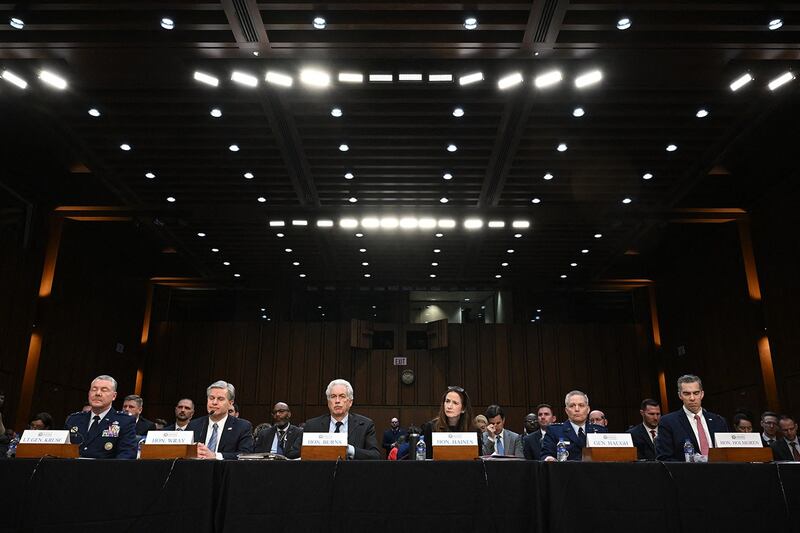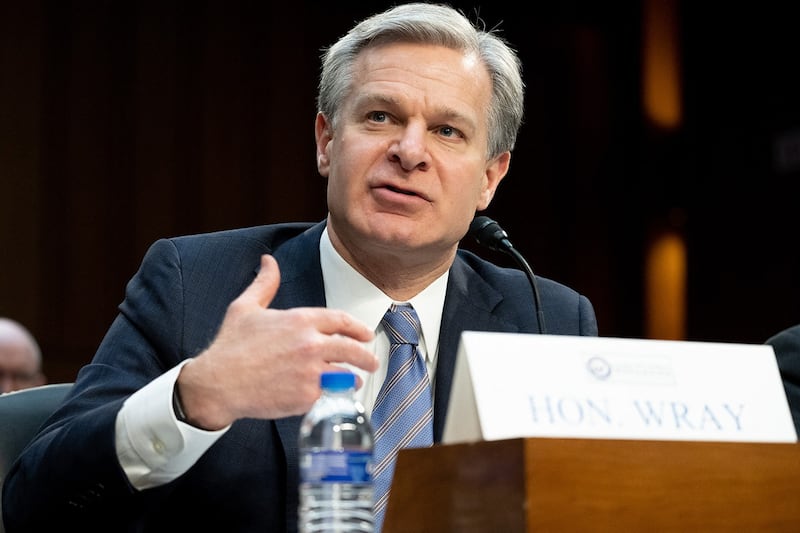UPDATED at 7:55 p.m. ET on March 11, 2024.
Beijing has improved its ability to covertly spread disinformation and may try to influence America’s 2024 presidential election, according to a report issued Monday by the U.S. intelligence community.
The annual worldwide threat assessment says Beijing is "expanding its global covert influence posture to better support" the goals of the Chinese Communist Party, with the aim "to sow doubts about U.S. leadership, undermine democracy, and extend Beijing's influence."
China has been “intensifying efforts to mold U.S. public discourse,” the report says, with a focus on shifting how Americans view Chinese sovereignty claims over Hong Kong, Taiwan, Tibet and the Xinjiang region, where the United States has accused Beijing of genocide.
But in the coming months, the report adds, the machinery of Beijing’s online influence operations may be increasingly concentrated on impacting the Nov. 5 presidential election, which looks set to again pit President Joe Biden against former President Donald Trump.
“The PRC may attempt to influence the U.S. elections in 2024 at some level because of its desire to sideline critics of China and magnify U.S. societal divisions,” it says, using an acronym for the People’s Republic of China.
Chinese state actors, it says, “have increased their capabilities to conduct covert influence operations and disseminate disinformation” and already have a track record of using artificial intelligence to generate political content on TikTok targeted at Americans.
“China is demonstrating a higher degree of sophistication in its influence activity,” the report says. “TikTok accounts run by a PRC propaganda arm reportedly targeted candidates from both political parties during the U.S. midterm election cycle in 2022.”
“Even if Beijing sets limits on these activities” this year, it continues, “individuals not under its direct supervision may attempt election influence activities they perceive are in line with Beijing’s goals.”
Balancing act
Any influence attempts, though, would likely be hard to detect, leaders of the intelligence community told U.S. lawmakers on Monday during a Senate Intelligence Committee hearing to accompany the report.

Director of National Intelligence Avril Haines said that while Chinese President Xi Jinping "was convinced that the United States will not tolerate a powerful China," he was also biding his time and has been seeking to avoid any tensions since his summit with Biden last year.
Xi “seeks to ensure China can maintain positive ties to the United States, and will likely continue to do so this year,” Haines said, because “stability in our relationship is important to [China’s] capacity to attract foreign direct investment” amid growing economic problems.
In an exchange with Sen. Marco Rubio, a Republican from Florida and his party’s top member on the intelligence committee, FBI Director Christopher Wray said he was worried by the ways that TikTok, one of the most popular social media apps in America, could be used.

Rubio posed a hypothetical scenario in which TikTok’s Chinese parent company ByteDance was approached by Beijing and told, “We want you to change your algorithm so Americans start seeing videos that hurt this candidate or help that candidate in the upcoming election.”
“ByteDance would have to do that under Chinese law,” Rubio said.
“That's my understanding,” Wray said. “That kind of influence operation … [is] extraordinarily difficult to detect, which is part of what makes the national security concerns represented by TikTok so significant.”
TikTok, which is the fourth most downloaded app on both the Apple App Store and the Google Play Store, is currently the target of a bipartisan effort by U.S. lawmakers to pass legislation that could force ByteDance to divest its ownership to avoid a ban on the app.
However, TikTok has strenuously denied being instructed by China to influence public discourse in the United States.
Liu Pengyu, a spokesperson for China’s embassy in Washington, on Monday denied Beijing had plans to interfere in the 2024 election.
“The election is U.S. domestic affairs, and China doesn’t interfere in other countries’ internal affairs. That is our principle. We have no intention to interfere in the US election,” Pengyu said in an email.
“Some in the U.S. should stop making unwarranted accusations and smears against China, and stop playing up the China topic in the election year,” he said.
Edited by Malcolm Foster. Updated to include comment from the Chinese Embassy.

